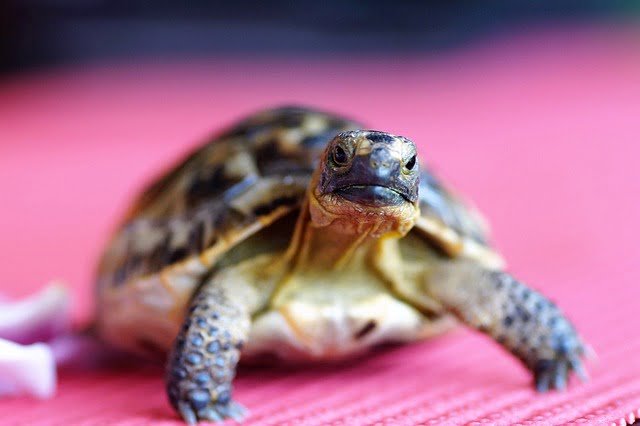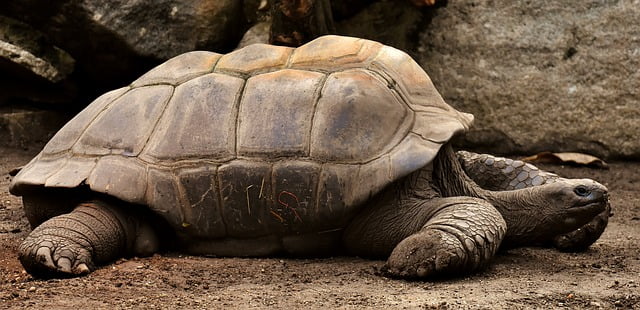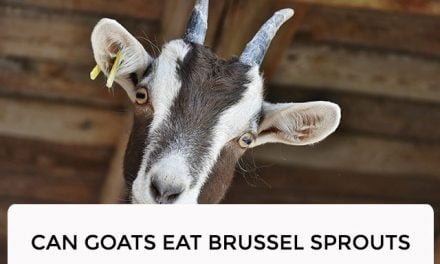Tortoises are herbivores, and they require a varied diet to stay healthy. Basil is a popular herb that many people use in their cooking, and it’s natural to wonder whether it’s safe to feed it to your pet tortoise. In this article, we will explore whether tortoises can eat basil and what benefits or risks it may pose.
Basil is a fragrant herb that’s commonly used in Italian and Mediterranean cuisine. It’s rich in nutrients such as vitamin K, vitamin C, and antioxidants, which makes it a healthy addition to human diets. However, when it comes to tortoises, we need to consider their unique dietary needs. While some herbs and plants are safe for tortoises to eat, others can be toxic and cause harm. So, can tortoises eat basil? Let’s find out.

Understanding Tortoise Diet
Tortoises are herbivores, which means they primarily eat plants. As such, their diet should consist of a variety of vegetables, fruits, and leafy greens. It is important to provide a balanced diet to ensure they receive all the necessary nutrients for their growth and overall health.
When it comes to feeding tortoises, it is important to know which foods are safe for them to eat. Some plants can be toxic to tortoises and should be avoided. For example, rhubarb and avocado are toxic to tortoises and should never be fed to them.
It is also important to consider the calcium to phosphorus ratio in their diet. Tortoises require a higher calcium to phosphorus ratio, as a deficiency can lead to metabolic bone disease. Foods that are high in calcium include kale, collard greens, and dandelion greens.
In addition to providing a variety of vegetables, fruits, and leafy greens, it is important to ensure that tortoises have access to clean water at all times. They should be provided with a shallow dish of water that they can easily climb in and out of.
Overall, understanding a tortoise’s diet is crucial to their health and well-being. Providing a balanced diet that includes a variety of vegetables, fruits, and leafy greens, along with access to clean water, can help ensure they thrive.
Can Tortoises Eat Basil?
Basil is a popular herb that is used in many different dishes, but can tortoises eat basil? In short, the answer is yes, tortoises can eat basil. Basil is a safe and healthy food for tortoises to eat in moderation.
Basil is a good source of vitamins and minerals that are important for a tortoise’s health. It contains vitamins A, C, and K, as well as calcium, iron, and magnesium. These nutrients are essential for maintaining a tortoise’s immune system, bone health, and overall wellbeing.
However, it is important to note that basil should only be given to tortoises as a treat or supplement to their regular diet. Tortoises should primarily eat a diet of leafy greens, vegetables, and fruits that are appropriate for their species.
When feeding basil to tortoises, it is important to wash it thoroughly to remove any pesticides or other harmful chemicals that may be present. It is also important to chop the basil into small pieces to make it easier for the tortoise to eat and digest.
In conclusion, basil can be a healthy and nutritious treat for tortoises when given in moderation. However, it should not be the primary source of food for tortoises and should only be given as a supplement to their regular diet.

Health Benefits of Basil for Tortoises
Vitamins and Minerals
Basil is a great source of vitamins and minerals that are essential for the health of tortoises. It contains vitamin A, which is important for maintaining healthy eyes and skin. It also has vitamin K, which helps with blood clotting and bone health. In addition, basil contains calcium, magnesium, and potassium, which are all important for maintaining strong bones and muscles.
Hydration
Tortoises need to stay hydrated to maintain their health, and basil can help with that. Basil contains a lot of water, which can help keep tortoises hydrated. This is especially important during hot weather when tortoises can become dehydrated quickly.
Digestion
Basil can also help with digestion in tortoises. It contains fiber, which can help keep the digestive system healthy and functioning properly. It also has antioxidants, which can help prevent damage to the digestive system.
In summary, basil can provide many health benefits for tortoises. It is a great source of vitamins and minerals, can help with hydration, and can aid in digestion. However, it should not be the only food that tortoises eat and should be given in moderation.
Potential Risks of Feeding Basil to Tortoises
Overconsumption
While basil is generally safe for tortoises to eat in moderation, overconsumption can lead to digestive problems. Basil contains high levels of oxalates, which can bind with calcium in the tortoise’s body and form calcium oxalate crystals. These crystals can cause blockages in the digestive tract, leading to constipation and other health issues.
To avoid overconsumption, it is recommended to feed basil as a treat rather than a staple food in the tortoise’s diet. A good rule of thumb is to offer basil once or twice a week, in small amounts.
Pesticides
Another potential risk of feeding basil to tortoises is exposure to pesticides. Basil is often sprayed with pesticides to protect it from insects and other pests. These pesticides can be harmful to tortoises if ingested.
To reduce the risk of pesticide exposure, it is recommended to use organic or homegrown basil when feeding tortoises. If using store-bought basil, it is important to thoroughly wash it before feeding it to the tortoise.
In summary, while basil can be a nutritious treat for tortoises, it is important to feed it in moderation and be mindful of potential risks such as overconsumption and pesticide exposure.
How to Feed Basil to Tortoises
Preparation
When feeding basil to tortoises, it is important to ensure that the basil is fresh and free of any pesticides or chemicals. We recommend washing the basil thoroughly before feeding it to your tortoise. It is also important to remove any stems or seeds from the basil, as these can be difficult for tortoises to digest.
Frequency
Basil can be a healthy addition to a tortoise’s diet, but it should be fed in moderation. We recommend feeding basil to your tortoise no more than once or twice a week, as too much basil can cause digestive issues. It is also important to vary your tortoise’s diet and not rely solely on basil as a food source.
When feeding basil to your tortoise, we recommend chopping it into small pieces to make it easier for your tortoise to eat. You can also mix the basil with other vegetables or fruits to create a balanced meal for your tortoise.
Remember to always monitor your tortoise’s behavior and health when introducing new foods to their diet. If you notice any adverse reactions or changes in behavior, consult with a veterinarian who specializes in reptiles.
Alternatives to Basil in a Tortoise Diet
While basil is a great addition to a tortoise’s diet, there are other herbs and greens that can provide the same nutritional benefits. Here are some alternatives to basil that you can feed your tortoise:
1. Dandelion Greens
Dandelion greens are a great source of vitamins A, C, and K, as well as calcium and iron. They are also low in oxalates, which can be harmful to tortoises in large amounts. You can feed your tortoise both the leaves and flowers of dandelions.
2. Mustard Greens
Mustard greens are high in calcium, iron, and vitamins A and C. They have a slightly bitter taste, which some tortoises may not like, but they can be mixed with other greens to make them more palatable.
3. Collard Greens
Collard greens are a good source of calcium and vitamins A and C. They are also low in oxalates, making them a safe choice for tortoises. However, they should be fed in moderation as they are high in goitrogens, which can interfere with thyroid function.
4. Endive
Endive is a good source of vitamins A and K, as well as calcium and fiber. It has a slightly bitter taste, which some tortoises may not like, but it can be mixed with other greens to make it more palatable.
5. Parsley
Parsley is a good source of vitamins A, C, and K, as well as calcium and iron. It has a strong flavor, so it should be fed in moderation. However, it can be a good addition to a tortoise’s diet when mixed with other greens.
Overall, there are plenty of alternatives to basil that can provide your tortoise with the necessary nutrients for a healthy diet. It’s important to offer a variety of greens to ensure your tortoise gets a balanced diet.

Frequently Asked Questions
What herbs can a tortoise safely consume?
Tortoises can safely consume a variety of herbs such as parsley, dandelion, and hibiscus. Other safe herbs include rosemary, thyme, and sage. However, it is important to note that not all herbs are safe for tortoises to eat, so it is best to do your research before introducing any new herbs to their diet.
What fruits are safe for tortoises to eat?
Tortoises can safely consume a variety of fruits such as strawberries, apples, and bananas. Other safe fruits include grapes, melons, and mangoes. However, it is important to note that fruits should only be given to tortoises in moderation as they are high in sugar.
Is basil safe for turtles and tortoises?
Yes, basil is safe for turtles and tortoises to consume. In fact, basil is a great source of vitamins and minerals for tortoises. However, it is important to remember that basil should only be given to tortoises in moderation as too much can cause digestive issues.
Can tortoises eat tomatoes?
Yes, tortoises can eat tomatoes. However, it is important to remove the seeds and skin before feeding them to your tortoise. Tomatoes are high in acid, so it is best to only give them to your tortoise occasionally.
What are some safe herbs for tortoises to consume?
Some safe herbs for tortoises to consume include parsley, dandelion, and hibiscus. Other safe herbs include rosemary, thyme, and sage. It is important to remember that not all herbs are safe for tortoises to eat, so it is best to do your research before introducing any new herbs to their diet.
What foods are toxic to tortoises?
Some foods that are toxic to tortoises include avocado, rhubarb, and chocolate. Other toxic foods include onions, garlic, and mushrooms. It is important to avoid feeding your tortoise any toxic foods as they can cause serious health issues.




